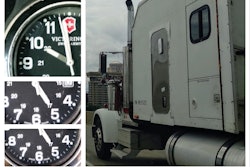The state of California and the International Brotherhood of Teamsters union have each responded to the Owner-Operator Independent Drivers Association’s (OOIDA) appeal of a case against California’s restrictive AB 5 independent contractor law.
OOIDA filed the opening brief in its appeal in August after a California district court judge in March ruled against the trucking industry in its effort to halt the state’s application of AB 5 to trucking businesses, ultimately deciding that truckers should make their case legislatively rather than judicially.
In the weeks following that March decision, OOIDA and the California Trucking Association filed appeals in the Ninth Circuit Court of Appeals, challenging the district court judge’s decision. CTA has since decided not to continue its legal challenge of the law, however.
In its opening brief filed Aug. 5, OOIDA said the law’s ABC test for determining worker classification -- particularly the “B” prong that requires a worker perform work that is outside the normal course of the hiring entity’s business – “effectively prohibits an entire sector of small business truckers from operating in California.”
[Related: TCA's Williams: Trucking faces fight in 'transformative time']
The group added that it’s not just limited to owner-operators and other contractors who live in California, but extends to all leased owners who work in California, regardless of where they’re from or how much time they spend in the state, constituting “an unreasonable burden on interstate commerce in violation of the dormant Commerce Clause of the U.S. Constitution.”

Read the full report on OOIDA’s appeal here.
As for California’s response, the state argues that the law does not violate the Commerce Clause and that OOIDA hasn’t provided a basis for invalidating AB 5’s “Business-to-Business” exemption, which would require, in part, that the owner-operator “is free from the control and direction of the contracting business.” The Truth-in-Leasing rules that apply to interstate truckers, however, require that motor carriers have “exclusive possession, control and use” of and “complete responsibility for the operation of” the leased owner-operator’s truck.
California said that OOIDA’s principal contention is that the ABC test violates a standard set forth in previous litigation, Pike v. Bruce Church, Inc., but the state said “OOIDA has not shown that the ABC test imposes the type of burden on interstate commerce that requests a balancing of a law’s benefits and burdens under Pike. Both this court and the Supreme Court have made clear that state laws do not trigger Pike balancing merely because they impose increased regulatory compliance costs.”
In Pike, a 1970 case that went to the Supreme Court, it was determined that even if a law does not discriminate on its face against interstate commerce, it is not permissible if the burdens to interstate commerce greatly exceed the benefits to local commerce.
[Related: Judge rules against trucking in latest attempt to block AB 5]
Further, California said “OOIDA is simply wrong in asserting that the ABC test ‘effectively prohibits an entire sector of small business truckers from operating in California.’” The state said under AB 5, motor carriers can continue working with owner-operators -- i.e., drivers who own their own trucks – “much as they did before AB 5’s enactment, by providing them with the benefits and protections owed to employees under California law. While carriers’ costs may increase as a result, mere increases in compliance costs do not qualify as a substantial burden under this court’s settled understanding of Pike.”
The state added that “even if OOIDA could show a cognizable burden on interstate commerce,” there still wouldn’t be a basis to invalidate the ABC test. On the Pike argument, California said before AB 5, numerous industries in California, including trucking, “were rife with misclassification.” The ABC test makes this more difficult, California argued.
In its business-to-business argument, OOIDA said the exemption discriminates between intrastate and interstate trucking operations, violating the Commerce and Equal Protection Clauses of the Constitution. California countered that argument saying the exemption applies equally to all business, regardless of whether they operate in interstate commerce.
Despite OOIDA’s claim that trucking can’t satisfy the exemption’s requirements due to the federal Truth-in-Leasing regulations, California claims OOIDA failed to show “that the relevant body of federal law has any such effect.”
[Related: Trucking groups appeal California court's latest AB 5 decision]
The Teamsters’ response
In addition to California’s response to OOIDA’s appeal, the International Brotherhood of Teamsters, an intervenor on the state’s behalf in the case, also filed a response arguing that OOIDA’s claims fall short.
The Teamsters said that OOIDA’s Commerce Clause claim fails because AB 5 doesn’t discriminate against out-of-state companies, nor does it impose a significant burden on interstate commerce.
“The district court correctly found that the burdens OOIDA asserted were simply the increased economic costs of complying with AB 5, which do not constitute significant burdens under this court’s precedents,” the Teamsters said. “The district court also correctly found that any such burden (if it existed) would not be clearly excessive in relation to AB 5’s putative local benefits and, therefore, that AB 5 is valid under the dormant Commerce Clause test established in Pike.”
The Teamsters added that “OOIDA grossly mischaracterizes AB 5 by asserting that it prohibits drivers who own or lease their own trucks from operating in California,” adding that these drivers “can easily work as employees or obtain their own federal motor carrier operating authority -- and have done both since AB 5 became effective -- and that there has been no industry-wide adverse impact.”
Addressing OOIDA’s B2B exemption claims, the Teamsters said that “while OOIDA falsely asserts that the federal Truth-in-Leasing regulations force interstate trucking companies to maintain a level of control that precludes them from qualifying for the B2B exemption, the district court correctly found otherwise.”
[Related: OOIDA's AB 5 appeal focuses on discrimination against interstate truckers]










